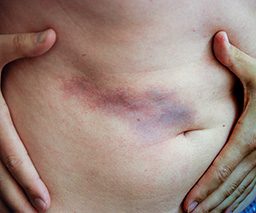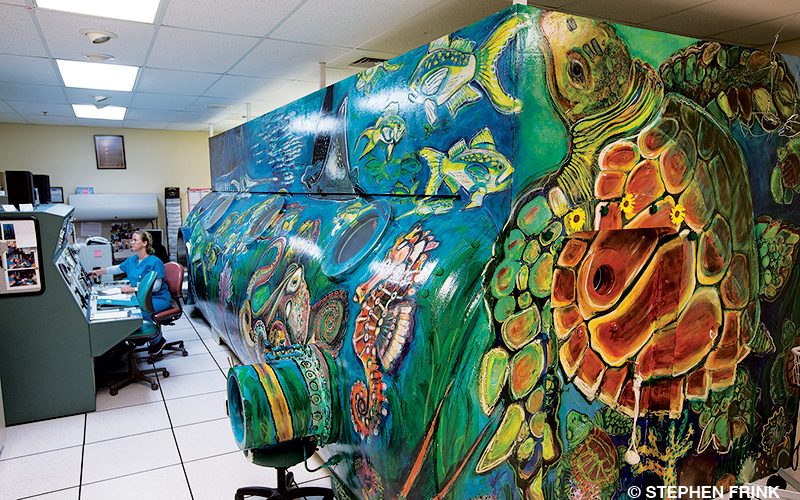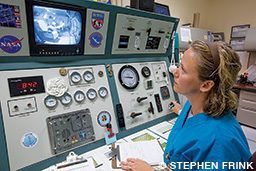While walking down the dock after our last dive, I noticed the skin on my stomach was feeling itchy. I didn’t think anything of it other than sea lice might have gotten inside my wetsuit. I went back to the room to shower and get dressed for a picnic on the beach.
We had been in Cuba for a week and had been diving for the past three days. I had done six dives, two per day, with similar profiles each day. They were all air dives between 60 and 104 feet deep — nothing extraordinary (besides the pristine Cuban reefs and gorgeous swim-throughs). I was comfortable and relaxed throughout. My deepest dive was to 104 feet, and that was the first dive on the day I experienced symptoms. I went to 93 feet on the second dive that day and did a long safety stop for about 10 minutes. I felt fine on the surface but was sad that I had done my last dive of the trip.
After I showered, my skin was still itching and what I believed to be a rash was developing; I thought I might be having an allergic reaction to whatever had “bitten” me. It didn’t seem serious though, so I got dressed and went to join my husband and the rest of our group at the picnic. When I got there I didn’t feel well, so I headed back to the room to lie down for a while. On my way I stopped at the first-aid clinic to see the doctor.
There was a language barrier since I don’t speak Spanish, and I muddled my way through trying to explain what I was feeling. I showed the doctor the red and white marbling on my abdomen. The doctor suggested that my BC might have been too tight, and he recommended that I take acetaminophen, rest and wait to see if the symptoms would subside.

I went to my room, took some Tylenol and lay down to rest. Though I was quite uncomfortable I eventually managed to sleep until my husband came to check on me two hours later. When I got out of bed I felt the itching sensation creep up to my breasts, and it was then that I first felt pain. Alarmed, I showed my husband my marbled skin, and he immediately said he thought it might be skin bends (cutaneous decompression sickness [DCS]). We decided to call DAN®.
Because we were in a remote area, cell-phone connectivity was problematic, and it took some time for the call to go through. Eventually we spoke to a DAN medical information specialist named Frances, who was great. My husband explained to her what was happening, and then she asked to speak directly to me.
Frances listened attentively to the details of my dives, my symptoms and the recommendations of the doctor at the resort clinic. She said she believed I might indeed be suffering from DCS and told me to return to the clinic right away for a thorough neurological evaluation and to begin breathing pure oxygen. She also offered to coordinate a physician-to-physician consult in Spanish to assist the local physician with the evaluation. She let me know that there were hyperbaric chambers on nearby islands and that she would explore getting me an airlift if one was needed.
On the way back to the clinic we called out to our trip guide, who luckily was within earshot, and let him know what was going on. Quite concerned, he immediately agreed to go with us to interpret. Having an interpreter sped up the process, and I was on oxygen in a matter of minutes. The clinic was very sparse, and the administration of oxygen lasted around 30-45 minutes. I felt better, and the symptoms subsided somewhat, so the doctor released me. I took it easy for the rest of the night and prepared for our five-hour bus ride back to Havana the next day.
I had residual tenderness in my abdomen and what I describe simply as “a sensation” on my left side. I felt well enough to go into town and do some sightseeing in Havana on Saturday, but I shared with my dive buddies my concern about our scheduled flight home the next day. After the 30-minute flight from Havana to Miami, the tenderness in my abdomen was worse, and the long walk through the airport to our car was quite uncomfortable for me.

The next morning I was in considerable pain, and my abdomen was swollen and disfigured. We called DAN, and again Frances was there for me. While she had me on the phone she called Mariners Hospital in Tavernier, Fla., which is the closest hyperbaric chamber facility to my home, and arranged for the chamber staff to meet me in the emergency room. I arrived at the ER and was taken back quickly, given oxygen and put through a series of tests to evaluate my condition. Despite me being four days postdive, the doctor decided to treat me in the chamber. I felt much better after the six-hour chamber treatment, though some abdominal soreness persisted for about a week.

Reflecting on the incident, I initially found it puzzling that of the 20 divers in our group I was the one who got DCS. I was one of the youngest, I have always stayed active and in shape, and I did not dive beyond any limits. But in the aftermath of the event I learned that the vast majority of DCS cases involve no identifiable causes or explanations (beyond time spent at depth). If I had to go through this all over again, next time I’d advocate for myself more forcefully.
Breathing oxygen from a cylinder is not the definitive treatment for DCS, and the doctor’s insistence that my BCD was too tight did not adequately explain all of my symptoms. I probably would have called DAN sooner in the first place and again the day before I flew. I knew it wasn’t a good idea to get on that plane with symptoms, so I would have liked to discuss that with DAN before we departed.
I realize how fortunate I am that my DCS was not any worse, and I’m so grateful that my husband has ensured we’ve always been covered by DAN dive accident insurance since we began diving in 1998. Neither of us ever wanted to have to dial that number, but I’m sure glad DAN was there for us when we did.
Share Your Story
Has DAN been there for you? Tell us about it at .
© Alert Diver — Q1 Winter 2017